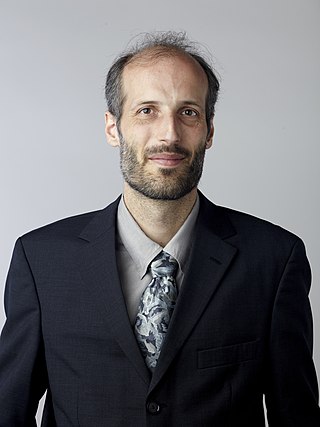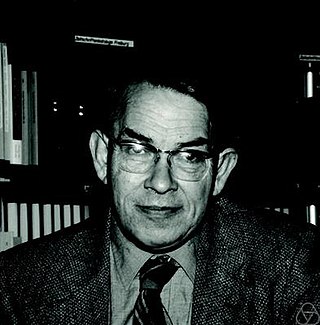
John Edensor Littlewood was a British mathematician. He worked on topics relating to analysis, number theory, and differential equations and had lengthy collaborations with G. H. Hardy, Srinivasa Ramanujan and Mary Cartwright.

John Henry Constantine Whitehead FRS, known as "Henry", was a British mathematician and was one of the founders of homotopy theory. He was born in Chennai, in India, and died in Princeton, New Jersey, in 1960.

The London Mathematical Society (LMS) is one of the United Kingdom's learned societies for mathematics (the others being the Royal Statistical Society, the Institute of Mathematics and its Applications, the Edinburgh Mathematical Society and the Operational Research Society.

Sir Martin John Taylor, FRS is a British mathematician and academic. He was Professor of Pure Mathematics at the School of Mathematics, University of Manchester and, prior to its formation and merger, UMIST where he was appointed to a chair after moving from Trinity College, Cambridge in 1986. He was elected Warden of Merton College, Oxford on 5 November 2009, took office on 2 October 2010 and retired in September 2018.
Albrecht Fröhlich FRS was a German-born British mathematician, famous for his major results and conjectures on Galois module theory in the Galois structure of rings of integers.
The Fröhlich Prize of the London Mathematical Society is awarded in even numbered years in memory of Albrecht Fröhlich. The prize is awarded for original and extremely innovative work in any branch of mathematics. According to the regulations the prize is awarded "to a mathematician who has fewer than 25 years of involvement in mathematics at post-doctoral level, allowing for breaks in continuity, or who in the opinion of the Prizes Committee is at an equivalent stage in their career."

Dame Mary Lucy Cartwright was a British mathematician. She was one of the pioneers of what would later become known as chaos theory. Along with J. E. Littlewood, Cartwright saw many solutions to a problem which would later be seen as an example of the butterfly effect.

Graham Higman FRS was a prominent English mathematician known for his contributions to group theory.
The Pólya Prize is a prize in mathematics, awarded by the London Mathematical Society. Second only to the triennial De Morgan Medal in prestige among the society's awards, it is awarded in the years that are not divisible by three – those in which the De Morgan Medal is not awarded. First given in 1987, the prize is named after Hungarian mathematician George Pólya, who was a member of the society for over 60 years.

David George Kendall FRS was an English statistician and mathematician, known for his work on probability, statistical shape analysis, ley lines and queueing theory. He spent most of his academic life in the University of Oxford (1946–1962) and the University of Cambridge (1962–1985). He worked with M. S. Bartlett during World War II, and visited Princeton University after the war.

Bryan John Birch FRS is a British mathematician. His name has been given to the Birch and Swinnerton-Dyer conjecture.
The Whitehead Prize is awarded yearly by the London Mathematical Society to multiple mathematicians working in the United Kingdom who are at an early stage of their career. The prize is named in memory of homotopy theory pioneer J. H. C. Whitehead.
The Senior Whitehead Prize of the London Mathematical Society (LMS) is now awarded in odd numbered years in memory of John Henry Constantine Whitehead, president of the LMS between 1953 and 1955. The Prize is awarded to mathematicians normally resident in the United Kingdom on 1 January of the relevant year. Selection criteria include work in, influence on or service to mathematics, or recognition of lecturing gifts in the field of mathematics. Previous recipients of top LMS prizes or medals are ineligible for nomination.
The Naylor Prize and lectureship in Applied Mathematics is a prize of the London Mathematical Society awarded every two years in memory of Dr V.D. Naylor. Only those who reside in the United Kingdom are eligible for the prize. The "grounds for award can include work in, and influence on, and contributions to applied mathematics and/or the applications of mathematics, and lecturing gifts."
The Berwick Prize and Senior Berwick Prize are two prizes of the London Mathematical Society awarded in alternating years in memory of William Edward Hodgson Berwick, a previous Vice-President of the LMS. Berwick left some money to be given to the society to establish two prizes. His widow Daisy May Berwick gave the society the money and the society established the prizes, with the first Senior Berwick Prize being presented in 1946 and the first Junior Berwick Prize the following year. The prizes are awarded "in recognition of an outstanding piece of mathematical research ... published by the Society" in the eight years before the year of the award.

Sir Martin Hairer is an Austrian-British mathematician working in the field of stochastic analysis, in particular stochastic partial differential equations. He is Professor of Mathematics at EPFL and at Imperial College London. He previously held appointments at the University of Warwick and the Courant Institute of New York University. In 2014 he was awarded the Fields Medal, one of the highest honours a mathematician can achieve. In 2020 he won the 2021 Breakthrough Prize in Mathematics.

Walter Kurt Hayman FRS was a British mathematician known for contributions to complex analysis. He was a professor at Imperial College London.
This is a timeline of women in mathematics.

Caroline Mary Series is an English mathematician known for her work in hyperbolic geometry, Kleinian groups and dynamical systems.
The Hirst Prize and Lectureship is a biennial prize, jointly awarded by the London Mathematical Society (LMS) and the British Society for the History of Mathematics (BSHM). The prize recognises original and innovative contributions to the history of mathematics by an individual winner or by joint winners.











